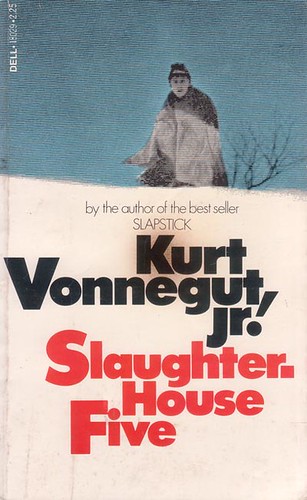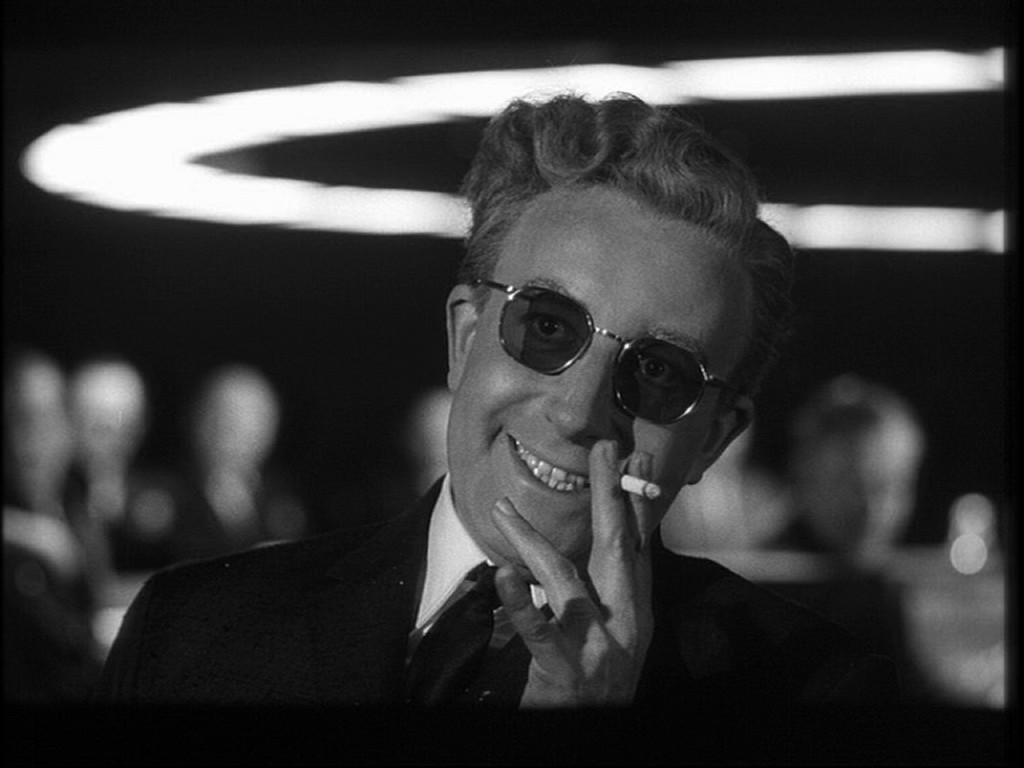
As we've read and seen, death is everywhere in dark comedy. It is the genre's most dominant theme.
Wes D. Gehring's fantastic book American Dark Comedy: Beyond Satire says that there are four basic lessons to be learned from dark comedy's obsession with death:
1) Death itself is a terrible absurdity.
2) The casual, random death which emphasizes the absurdity and shows how insignificant human beings are in the scheme of things.
3) The popularity of suicide.
4) People's callousness to shock.
Slaughterhouse-Five is full of death. So it goes. Vonnegut's ho-hum attitude toward death shows how absurd and meaningless both life and death really are. I posted a Youtube clip where Vonnegut discusses his actual experience in Dresdon. He, like Billy in the novel, had to mine through the rubble for corpses. The corpses would be thrown into a pile, along with some wood, and then set on fire. The image is horrifying. None of us can truly understand that horror. The sight. The smell.

One terribly absurd (and ironic) death happens to Billy Pilgrim's wife, Valencia. She's heard Billy's plane has crashed and that he's been hospitalized. In a panic, she drives over to the hospital and in her frenzied, emotional state she gets into a car crash. Nobody is seriously injured but Valencia's exhaust system has been ripped off in the crash. This doesn't stop her. She has to see her beloved husband (who the doctors believe may end up a vegetable--more irony?). She drives away from the accident with no exhaust and continues on her journey to the hospital. She finally gets to the hospital where she dies from carbon monoxide poisoning.
The death of Edgar Derby can go along with lesson number two. Derby, who has survived the fire-bombing of Dresdon, picks among the rubble and discovers a teapot. He is accused of stealing the teapot, tried, and shot by a firing squad. We are told about Derby's death in Chapter One when the narrator (Vonnegut) says that this event will be the climax of the book. Why is this the climax?
The shock in Slaughterhouse-Five comes from the casual 'so it goes' attitude toward death. Almost every page has a death of some kind followed by the narrator's 'so it goes'. Why do you think Vonnegut does this? Did you notice a change in your reaction to the deaths as you read further and further along? I'd like to hear your thoughts on this.
What your thoughts on death in the dark comedy we've read or seen? Any other examples to add to the list? What is your reaction to the death in the books we've read and the films we've watched?
Bibliography
Gehring, Wes D. American Dark Comedy: Beyond Satire. Westport, CT: Greenwood Press, 1996.




2 comments:
I think this book perfectly illustrates something that uptight mothers everywhere scream about daily: desensitivity to death and violence. In the beginning of the book, yes, it was a little unnerving to have Vonnegut shrug it off so meaninglessly, as if this person's life meant nothing, but probably halfway through the book I was wishing people would stop dying because I was getting so irritated at reading "So it goes" every 5 sentences. I stopped thinking "how sad" and started thinking, "man that's annoying." It also helps that he offers help to this sort of thinking. On page 26, he explains that the most important thing Billy Pilgrim learned from the Tralfamadorians was their time perception, that no one is really dead forever, just for a while. It's kind of a comforting fact, really. Actually, just reading this book has helped me a little. Over the summer, my future mother-in-law committed suicide, and it was extremely difficult (as is all death), and her son is still having trouble dealing with it, as any kid would. I started out being kind of sensitive in this class to all the talk about death because of this, and because the pain is so fresh. However, after reading this book, while it is still sad, it helps to have this sort of mentality that death isn't a permanent thing, which, having some sort of faith-base, it isn't.
Also, commenting on the fact that these sights and smells were gut-wrenchingly terrible, I'm reminding of something equally disgusting I heard about. Apparently there is a new video floating on the Interweb titled "Two Girls One Cup" or some variation of that. If you haven't heard it, don't try to watch it. It involves two girls, fecal matter, vomit, and making out. As I was discussing it with a coworker (in a family fun amusement center, no less) she commented that she had to laugh, or else she herself would puke. I think it works in the same context here. While these men are surrounded by dead rotting flesh, they need to ignore their surroundings, and literally remove all meaning from it. It doesn't seem to be so appalling after that.
(For the record, I have NOT watched the aforementioned video.)
For whatever reason, I feel as if the subject of death, or any wise crack involving something dead, has recently become the most hilarious topic to center a joke around. In fact, and especially in this class, I'm beginning to expect it from everything that I read. Is that weird? Very. Is it wrong? I don't think so. But I have to admit, reading all of this "dark comedy" is really starting to feel like we're just beating a dead horse here.
And on that note... Slaughter House Five. Vonnegut, not to be confused with the Montague (Though both literary icons of death), seemingly evolves his entire novel "SH5" on the same joke, or thought, or philosophical belief, in that the story is not a story, but more or less a very funny man, with a very simple idea: Things die. Things break. Attachment is a human characteristic that both Aliens, and Germans simply don't possess. Then again both will still die, so I guess it doesn't matter. And Ted William's body someday will unfreeze, and deteriorate, and all of that money will ultimately be lost and forgotten, forever and ever. So it goes.
So it doesn't? Vonnegut's rinse and repeat formula for delivering his theme i.e. Death, segway, death, segway... I feel is just a funnier way of explaining existentialism to someone. And I say this without knowing entirely the definition, but after having seen "I heart Huckabees" some 3 or 4 times, there's at least a degree of cinematic merit behind my thoughts.
But what does that have to do with anything? I'm not entirely sure, but then again I think the same could be said about SH5. Because in all actuality, nearly every paragraph/page/ segment "thingy" in the book could have easily been swapped with something else. And many of the segments could have been plucked out and dropped somewhere else, some 200 pages over. As the only real similarity I can find between any of those segment things, is that both the main character and the narrator himself, have just grown so accustomed to things breaking, and dieing, that they simply now lack the ability to separate, and distinguish the two. Which is funny. But then again most things are funnier on paper. And in my opinion, that's the only thing still separating the author from the Psych Ward. That and a Purple Heart.
Post a Comment